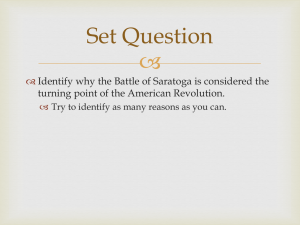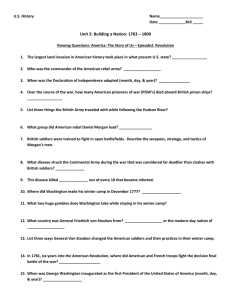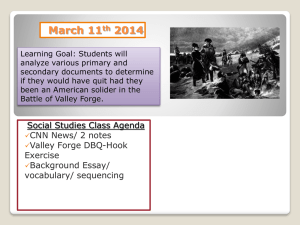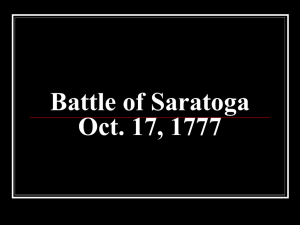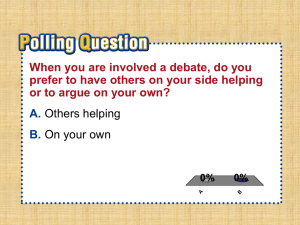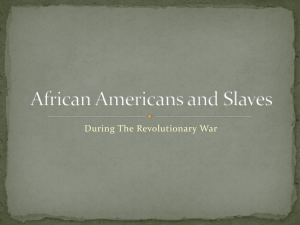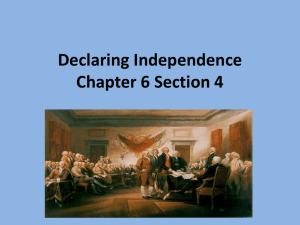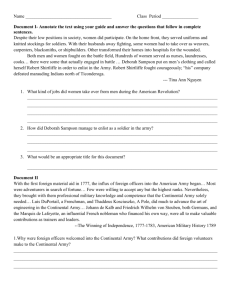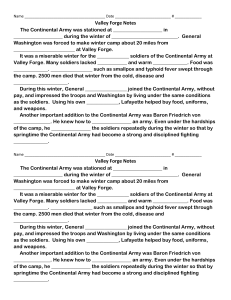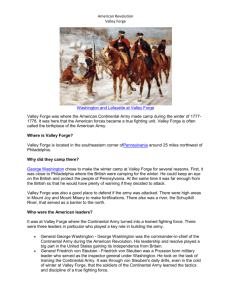The Continental Army at Valley Forge, 1777 The
advertisement
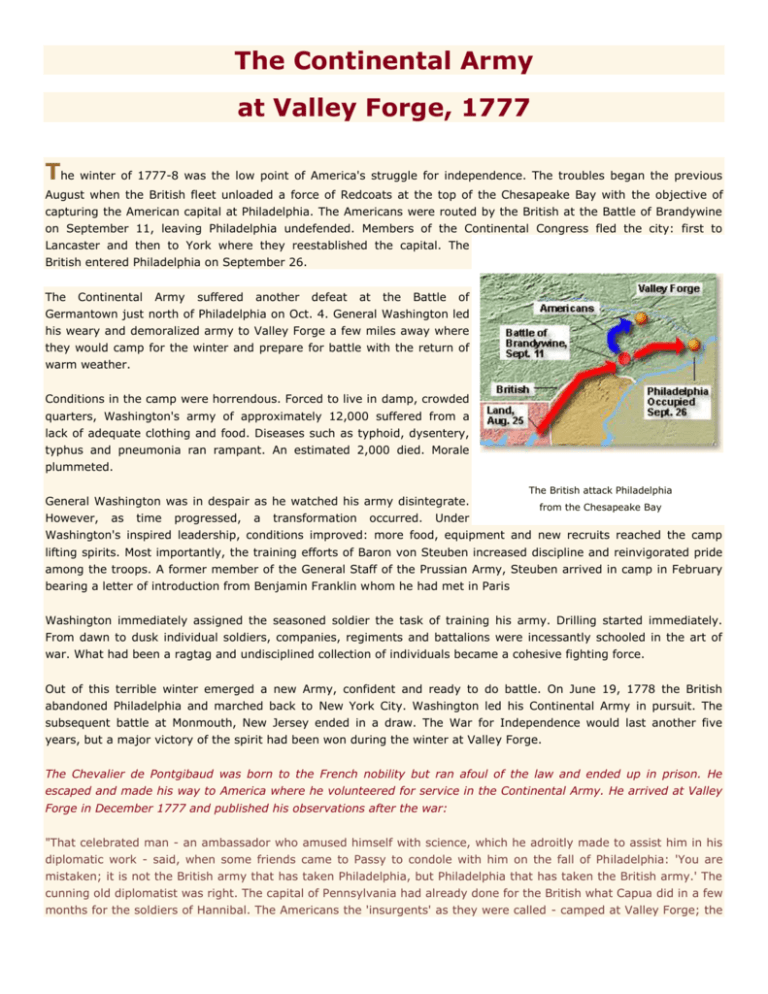
The Continental Army at Valley Forge, 1777 The winter of 1777-8 was the low point of America's struggle for independence. The troubles began the previous August when the British fleet unloaded a force of Redcoats at the top of the Chesapeake Bay with the objective of capturing the American capital at Philadelphia. The Americans were routed by the British at the Battle of Brandywine on September 11, leaving Philadelphia undefended. Members of the Continental Congress fled the city: first to Lancaster and then to York where they reestablished the capital. The British entered Philadelphia on September 26. The Continental Army suffered another defeat at the Battle of Germantown just north of Philadelphia on Oct. 4. General Washington led his weary and demoralized army to Valley Forge a few miles away where they would camp for the winter and prepare for battle with the return of warm weather. Conditions in the camp were horrendous. Forced to live in damp, crowded quarters, Washington's army of approximately 12,000 suffered from a lack of adequate clothing and food. Diseases such as typhoid, dysentery, typhus and pneumonia ran rampant. An estimated 2,000 died. Morale plummeted. General Washington was in despair as he watched his army disintegrate. The British attack Philadelphia from the Chesapeake Bay However, as time progressed, a transformation occurred. Under Washington's inspired leadership, conditions improved: more food, equipment and new recruits reached the camp lifting spirits. Most importantly, the training efforts of Baron von Steuben increased discipline and reinvigorated pride among the troops. A former member of the General Staff of the Prussian Army, Steuben arrived in camp in February bearing a letter of introduction from Benjamin Franklin whom he had met in Paris Washington immediately assigned the seasoned soldier the task of training his army. Drilling started immediately. From dawn to dusk individual soldiers, companies, regiments and battalions were incessantly schooled in the art of war. What had been a ragtag and undisciplined collection of individuals became a cohesive fighting force. Out of this terrible winter emerged a new Army, confident and ready to do battle. On June 19, 1778 the British abandoned Philadelphia and marched back to New York City. Washington led his Continental Army in pursuit. The subsequent battle at Monmouth, New Jersey ended in a draw. The War for Independence would last another five years, but a major victory of the spirit had been won during the winter at Valley Forge. The Chevalier de Pontgibaud was born to the French nobility but ran afoul of the law and ended up in prison. He escaped and made his way to America where he volunteered for service in the Continental Army. He arrived at Valley Forge in December 1777 and published his observations after the war: "That celebrated man - an ambassador who amused himself with science, which he adroitly made to assist him in his diplomatic work - said, when some friends came to Passy to condole with him on the fall of Philadelphia: 'You are mistaken; it is not the British army that has taken Philadelphia, but Philadelphia that has taken the British army.' The cunning old diplomatist was right. The capital of Pennsylvania had already done for the British what Capua did in a few months for the soldiers of Hannibal. The Americans the 'insurgents' as they were called - camped at Valley Forge; the British officers, who were in the city, gave themselves up to pleasure; there were continual balls and other amusements; the troops were idle and enervated by inaction, and the generals undertook nothing all the winter. Soon I came in sight of the camp. My imagination had pictured an army with uniforms, the glitter of arms, standards, etc., in short, military pomp of all sorts; Instead of the imposing spectacle I expected, I saw, grouped together or standing alone, a few militiamen, poorly clad, and for the most part without shoes - many of them badly armed, but all well supplied with provisions, and I noticed that tea and sugar formed part of their rations. I did not then know that this was not unusual, and I laughed, for it made me think of the recruiting sergeants on the Quai de la Ferraille at Paris, who say to the yokels, 'You will want for nothing when you are in the regiment, but if bread should run short you must not mind eating cakes.' Here the soldiers had tea and sugar. In passing through the camp I also noticed soldiers wearing cotton nightcaps under their hats, and some having for cloaks or greatcoats coarse woolen blankets, exactly like those provided for the patients in our French hospitals. I learned afterwards that these were the officers and generals. Such, in strict truth, was, at the time I came amongst them, the appearance of this armed mob, the leader of whom was the man who has rendered the name of Washington famous; such were the colonists - unskilled warriors who learned in a few years how to conquer the finest troops that England could send against them. Such also, at the General von Steuben trains American troops at Valley Forge beginning of the War of Independence, was the state of want in the insurgent army, and such was the scarcity of money, and the poverty of that government, now so rich, powerful, and prosperous, that its notes, called Continental paper money, were nearly valueless. " References: This eyewitness account was first published in Chevalier de Pontgibaud (Robert Douglas, ed.) A French Volunteer of the War of Independence (1898) republished in Commager, Henry Steele and Allan Nevins, The Heritage of America (1939); Reed, John F. Valley Forge, Crucible of Victory (1969). How To Cite This "The Continental Army at Valley Forge, 1777," EyeWitness to History, www.eyewitnesstohistory.com (2006). Article:
